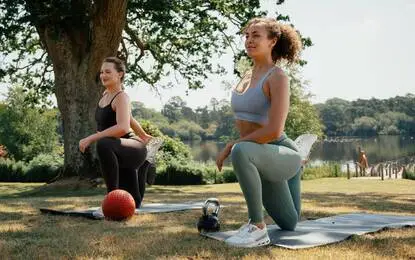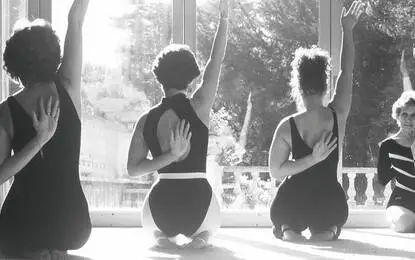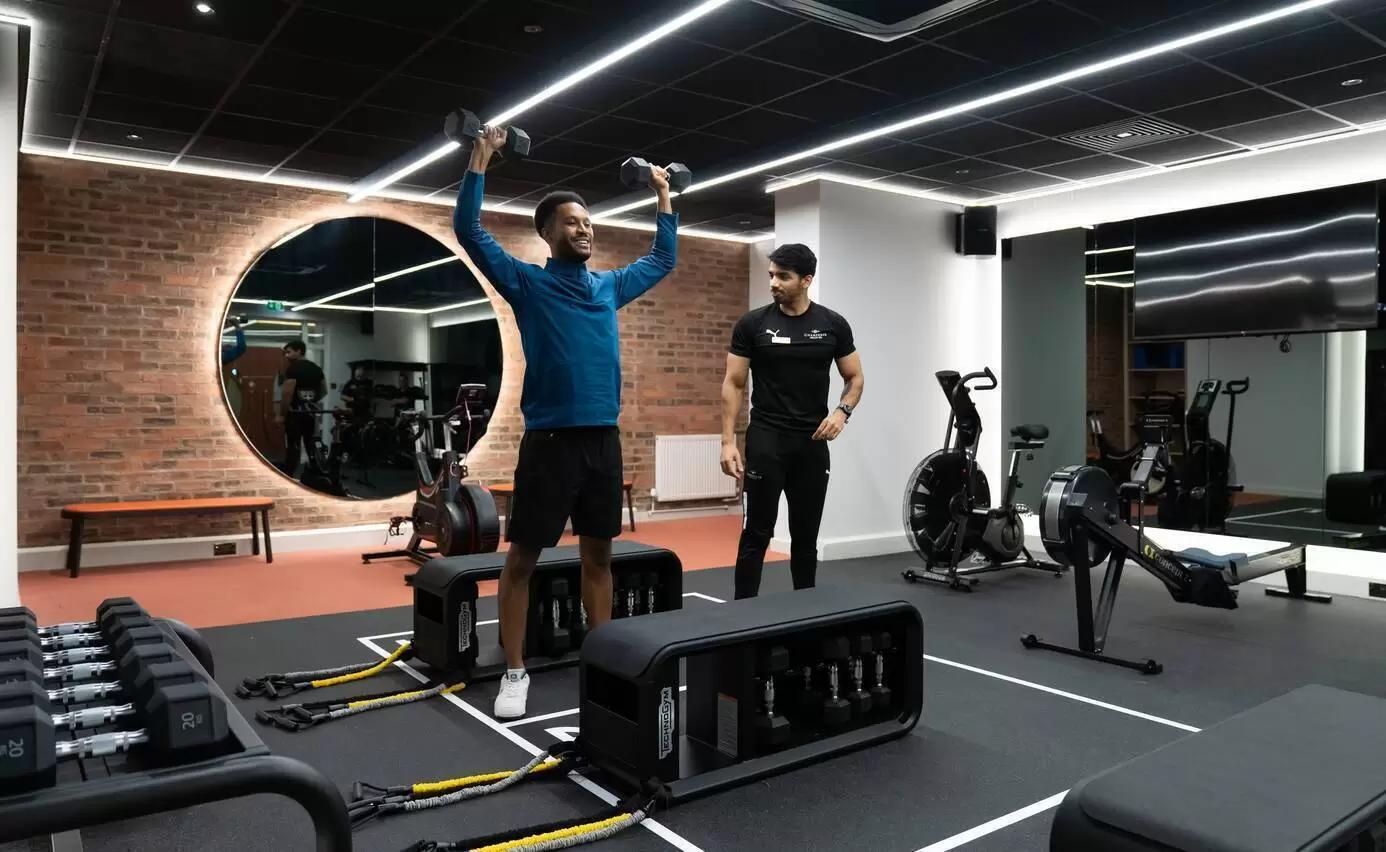Setting a fitness routine
Whether it’s the January running bug that runs out of steam by March or the gym classes that become less and less consistent, many people struggle to stick to their fitness goals. The difficulty in sticking with our exercise plans can stem from numerous causes, be it busy lifestyles, a lack of immediate results or mere boredom.
Whatever the cause, however, the consequence is clear: individuals who are frustrated from the lack of benefits they feel from their fluctuating routine, with diets and moods that follow these highs and lows.
“Whoever we are, we manifest that in all of the realms of our life,” James Gavin, Ph.D., professor of applied human sciences at Concordia University in Montreal tells The Huffington Post. “Physical activity is just another expression of our personal preferences and style. When people are similar to the activities they pursue,” says Gavin, “they tend to be happier, express more satisfaction and stay with it longer.”
For this very reason, attempting to follow a one-size-fits-all workout plan is destined to fall short, as it doesn’t account for our unique preferences and commitments. Instead, it is important to understand what motivates you to exercise, what you are hoping to achieve through doing so, and how you could actually enjoy the process. Enter: the fitness personality.
Quiz: Find your personal fitness style
By taking this quiz, you will become more in tune with your own fitness style, from your attitudes towards health to the places you prefer to work out. This will help you choose a fitness routine that really works for you.
How do I feel about working out?
Be honest with yourself. If you’re not a fan of working out straight off the bat, there’s little point in forcing yourself to take up a gruelling high intensity interval training (HIIT) plan five times a week. If you’re the kind of person who is committing to exercise purely for health reasons, rather than for leisure, then be honest with yourself and set realistic goals, trying to make the process fun.
Dave Smith, award-winning wellness coach and blogger at Make Your Body Work, comments:
“The most important type of exercise for most people is strength training. I'd have my clients choose strength training over cardio training any day of the week because it offers benefits for metabolism, joint health, posture, and cardio conditioning. It's an all-in-one fitness solution. That being said, a lot of people hate going to the gym. And to those people I say, ‘Don't go!’”
“Forget what you've been told about exercise and just focus on moving your body every single day. I've seen people drop 100 pounds or more simply by walking. Fitness doesn't have to be complicated - just move your body in a way that feels good.”
What do I want to achieve from my exercise plan?
This is important to establish early on. So many people make the mistake of following a strict routine for a few weeks, only to cease exercise entirely because they’re not seeing the results they hoped for. Of course, physical results take time, but often the problem is that we’re doing the wrong exercises for our aims. For example, if you hope to slim down to become lean, focussing solely on weight-bearing toning activities will not help you achieve this – running and bodyweight exercise such as climbing might be more suitable. Consult a personal trainer to find out how to reach your goals in the most effective manner.
How much time do I have?
Most of us live very busy lives - whether it is a demanding job or a young family – the day can quickly be filled up with commitments, leaving little time for exercise. Alternatively, it may be the case that you have plenty of free time on certain days and none at all on others. Try to take a look at your average week and work out a plan that fits into your lifestyle. If you’re consistently short on time, you may benefit from following a short, high-intensity toning routine. If you come home from work exhausted, why not head to the gym for an hour before your working day starts, so that you can have a well-earned rest in the evening? Whatever fits your routine and makes you feel rested and energised, work it into a regular plan.
How do I like to work out?
This question has a couple of layers to consider. Firstly, think about where you like to work out. Do you thrive off the structure of the gym, and love the many different machines there to help you tone different muscle groups? Do you prefer to exercise in the comfort of your own home? Or do you love the rush of getting into the great outdoors as you work out? Think about where you feel the most inspired to exercise, and choose a few exercise routines that complement this.
It is also key to consider how sociable you are when it comes to fitness. Some of us are driven by having a friend to work out with, someone to turn to for support, encouragement and perhaps a little healthy competition to make the process more fun. Others, however, find working out to be a very personal affair, and prefer to exercise alone so that they can focus on their own goals, and have a little time to themselves. Either way is completely fine, but try to be honest with yourself about which way you lean.
Which activities do I enjoy?
Whilst it’s key to determine the exercises that will help you to achieve your fitness objectives, this doesn’t mean you have to shun the activities that you enjoy, simply for the fun of it. Adding your favourite sports into your exercise routine – even if initially just for fun – is a great way to keep you excited about working out. Whether it’s joining a Zumba class to feed your love of dance, starting a five-a-side football tournament with work colleagues or going surfing on the weekends, keep your passions alive and you may well find that it helps you get into shape more than you anticipated!
Finding an exercise plan that suits your style
So now you might have a better idea of what kind of your fitness personality, all that remains is to formulate an exercise plan that truly suits you, one that you can stick to and, most importantly, enjoy.
Jenn Mitchell from the fitness and lifestyle blog Comeback Momma explains this:
“Figuring out your workout style is really based on what you find most enjoyable. You will not stick to a fitness plan if it’s not fun, at least in some way. If you tend to be a relaxed person, you might like yoga. If you love to dance, Zumba would be right up your alley. If you are competitive, train for events like 5Ks, marathons, etc. Outdoor folks should consider hiking, cycling and kayaking. Are you an office worker who is short on time? Even 10 minute brisk walks 2-3 times a day can make a big difference. Anything that gets your body moving in a way you’ll enjoy will help you stick with it. Make it easier by finding a friend with similar interests so you can hold one another accountable.”
Of course, not everyone fits into simple categories – so don’t force yourself into a strict routine without accounting for the need of variety. Nikki from the blog NikkiFitness explains how she negotiates this for herself:
“My personal fitness style is funny because it's polar opposites. I love HIIT training with hard intervals of cardio and muscles sculpting, but I also love advanced yoga with ‘tada’ poses that are almost gymnastic-looking. I put them together in one workout and coined ‘Slimnastics!’ It's the name of my book and one of my 12 fitness DVDs/videos on the NikkiFitness app.”
She advises, “Find what you like and combine them! If you love spin and Pilates, think of a way to do both at the same workout, or just cross-train for a well-rounded workout week!”
Here are a few more handy tips on how to tailor your workout plan to ensure you are complementing your personal fitness style:
Join a couple of classes
If you’re interested in a few different forms of exercise, but aren’t sure how to keep doing them all in regular rotation, consider joining a few classes. Two or three different sessions per week in various types of sport will guarantee you the variety that will keep up your interest. As these are led by experts, classes will also ensure you are getting the most out of each session, and will help you to track your progress. You can still add in any personal workout sessions around your class schedule, but this will give you something to commit to, maximising your chances of maintaining your routine.
Try a fitness retreat
If you have an idea of what kind of fitness style you have, but aren’t sure exactly how to plan your workouts to suit it, it might be worth booking a fitness retreat. Here, you can try out various different activities to find out which you enjoy the most. But, most importantly, you will be coached by some of the world’s finest personal trainers, fitness experts and nutritionists, who will help you to understand why certain things will work for you and how to maximise your workouts every day. You might choose the holistic approach of a health management retreat, which are all about education and balance. Alternatively, you may decide to try a boot camp retreat, which uses a collection of indoor and outdoor activities, team games, intensive weight-loss programmes and health monitoring to kick-start your exercise routine. Whatever you choose, these retreats will immerse you in the process of successful fitness, helping you to get into the swing of things.
Buddy up!
Finally, consider getting yourself a fitness partner. Even if you prefer to go it solo when you’re actually exercising, having someone to consult about your progress can really help you to stick to your plan. Whether it’s going for a run with a friend to motivate you to keep up the pace, hitting the gym with a colleague before work, or simply checking in with your partner about your progress each week, getting a ‘fitness buddy’ will make you accountable and nudge you to keep going.
David de las Morenas from the renowned fitness blog, How to Beast, sums up the importance of finding a fitness plan to suit your personality. It is, as he indicates, ultimately all about enjoyment:
“Personally I love lifting heavy weights and pushing my strength limits. I have friends who prefer to challenge their body by running multiple marathons. And others who are addicted to the calming sensations of yoga (don't let the smiles and breathing deceive you, it's still extremely hard). The key is to embrace whatever gets you excited to leave your house and get your body moving. Get better at it. Keep improving. Make it your passion.”



























